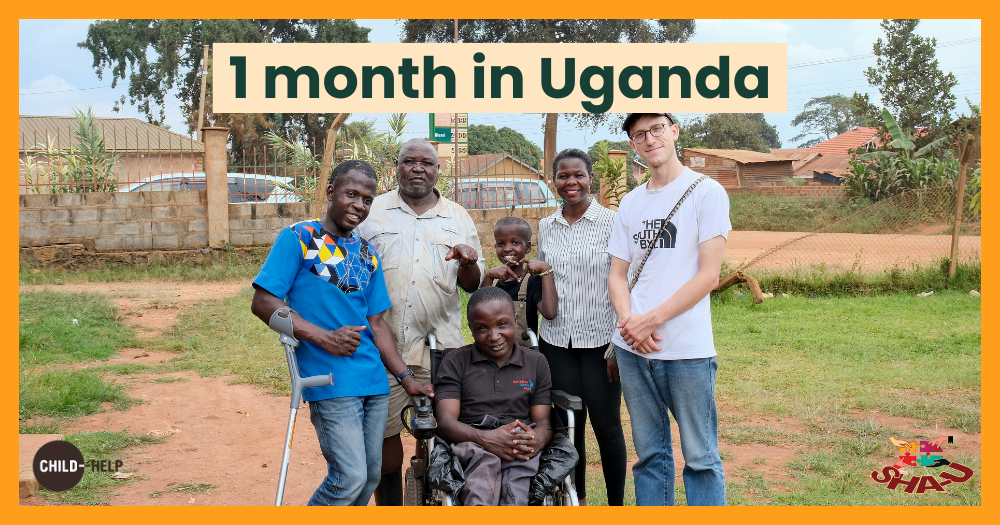
Kampala offers a lot but demands a lot in return. It’s a bustling city, and there’s constantly something happening all around you. I barely arrived and immediately got to work. There are many challenges, and it will be difficult to overcome them all. Nevertheless, I am confident and feel ready to tackle them. Upon my arrival, I meet Benjamin. He has been working at SHAU for the past 4 years. He gives me a tour of the house that welcomes mothers from all corners of Uganda with one hope: to learn how to care for their child with Spina Bifida or Hydrocephalus.
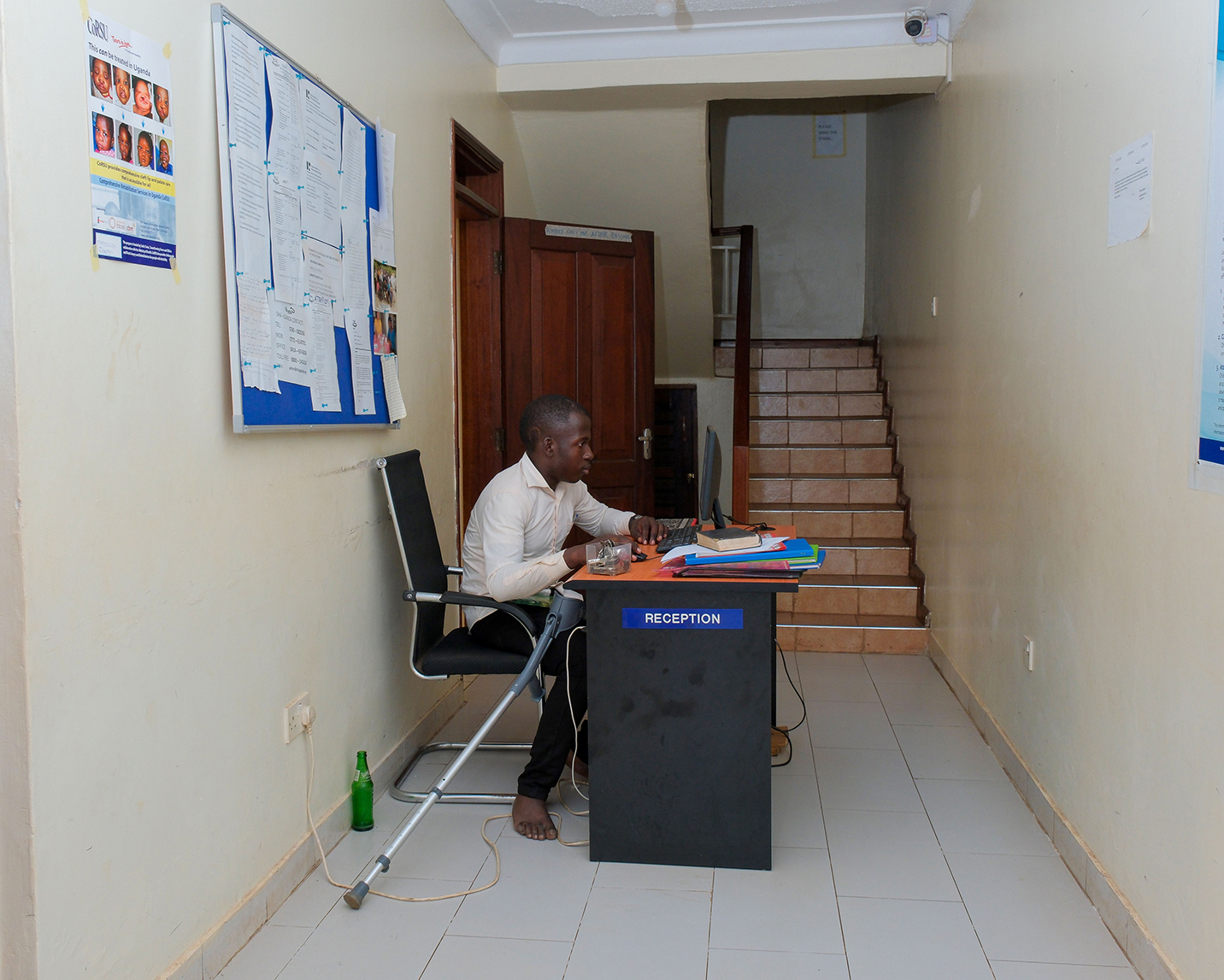
SHAU is an organization dedicated to combating all forms of discrimination against children with Spina Bifida and/or Hydrocephalus. They like to describe themselves as an “umbrella” because SHAU collaborates and works extensively with other regional and international organizations (Child-Help being one of their partners), covering every sector. One of their most significant battles is for inclusion. Beyond providing care before, during, and after various surgeries, they also strive to make parents and children understand that despite their disabilities, there are ways to be “useful” in society by pursuing various professions. SHAU is thus advocating for an inclusive society where these children are accepted for who they are in all existing facets.
Here I am, faced with my first case of Spina Bifida. We begin by discussing the consequences of this condition while providing care to the child. What I see leaves me stoic. I felt a deep sense of compassion for the mother who has to confront this battle every day. The goal of the SHAU members is primarily to restore hope to these mothers. Their work starts from the hospital (where the mothers await surgery for their child) to post-operative treatment.
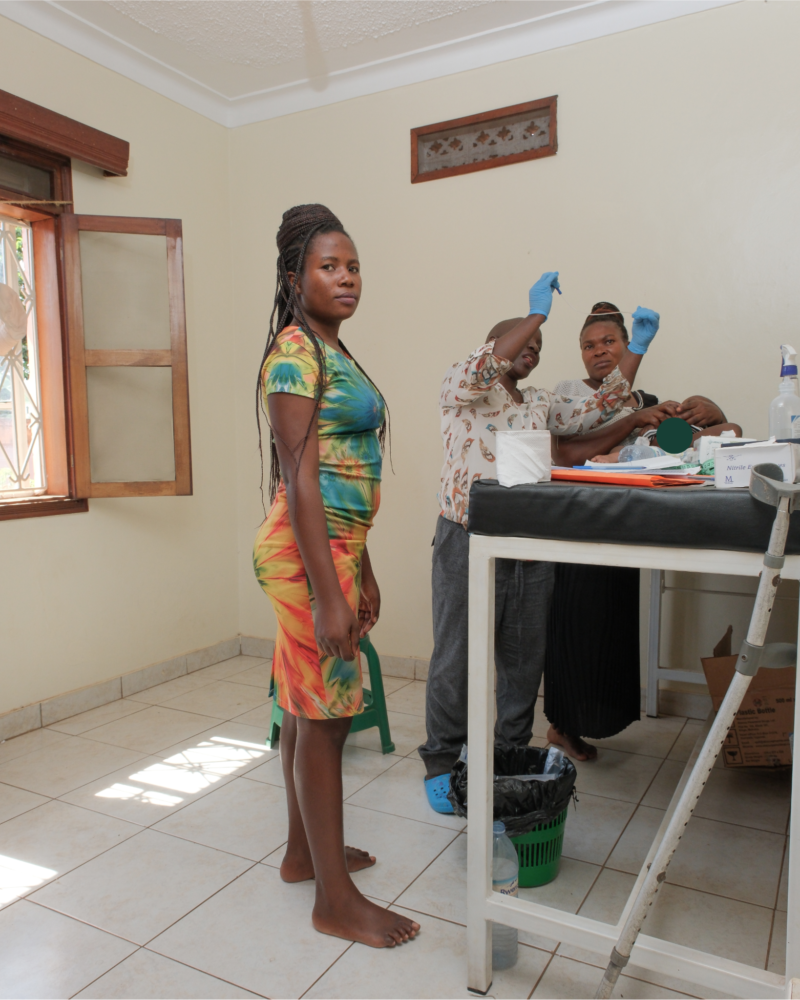
Today, I meet 5-year-old Tawfiq, who has Spina Bifida, and his mother. I learn that possible consequences of the disease are urinary tract and bowel problems. Tawfiq means “success” in Arabic. His name takes on even more meaning given the real condition he has faced since birth. The “House of Hope”, as SHAU calls it, exists for exactly this reason – to shelter, care for and prepare these children for a normal life despite their disabilities.
Later in the day, I meet a father and his child, Steven, but he is affectionately called Stevie by the SHAU team. They have come for the same reason as Tawfiq’s mother – a urine drainage through the insertion of a catheter. Stevie will turn 15 in November and his dream is to become a doctor. He already has the qualities of a leader and seems to handle his challenging situation remarkably well. His level of self-acceptance is quite remarkable and inspiring. Meeting him on my first day in the field was a life lesson I will not soon forget. In my eyes, Stevie embodies a wonderful example of resilience. He is constantly smiling despite the difficult progression of his body after surgery.
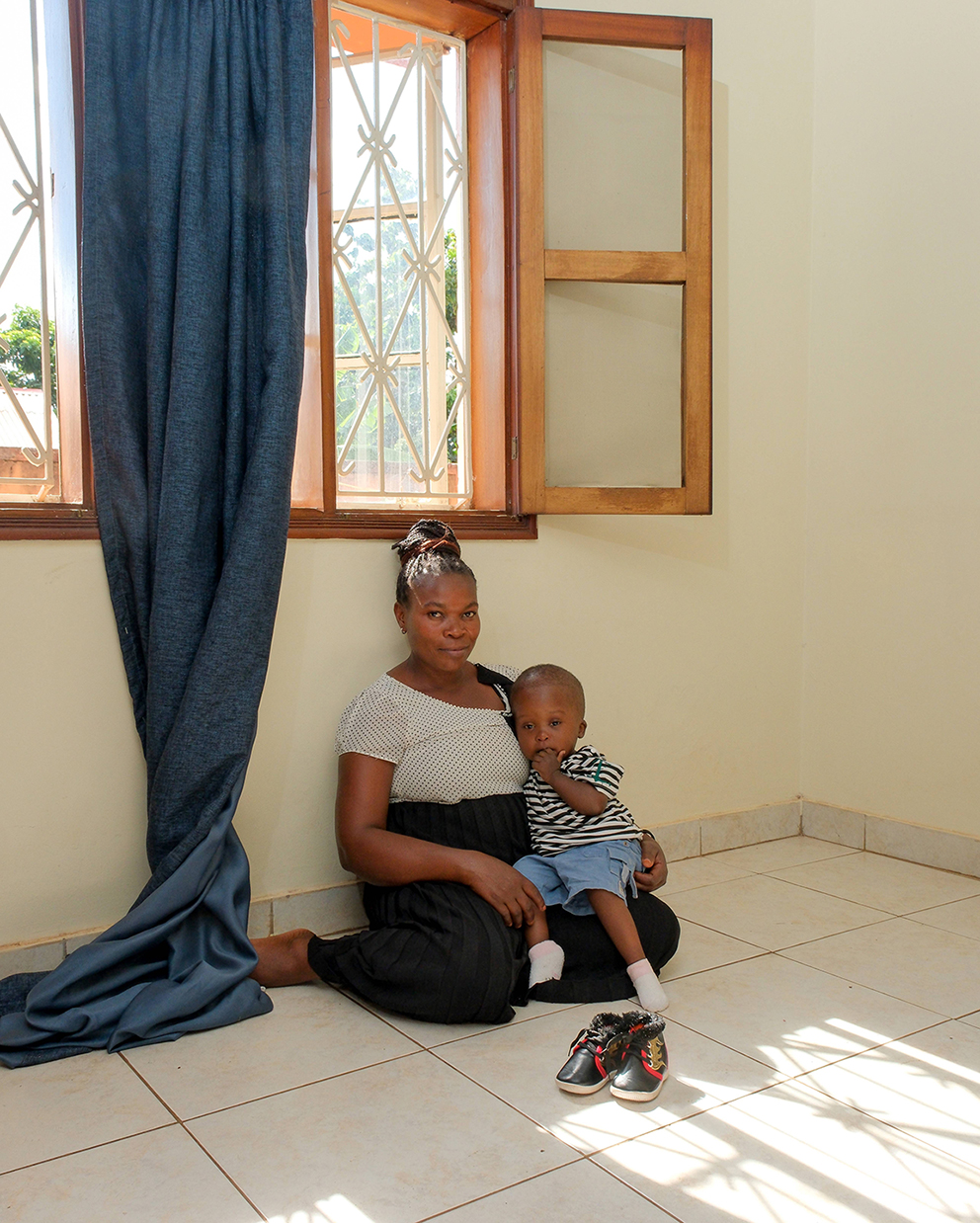
My first weekend since arriving in Kampala. After an introductory first week, I take time to rest and reflect on what I have seen and experienced. On this sunny Saturday, we stay at the House of Hope for an information session led by Winfred. SHAU has several information sessions, meetings and question-and-answer sessions on spina bifida and hydrocephalus in its project.
I see fathers, mothers and children of all ages. Before I can start taking photos, I take time to introduce myself to the people. This helps them get used to me and ensures I don’t disturb them during class. Once there is a rapport between them and me, I get started by attending the session. The programme covers various topics such as “how do I take care of myself” and “the importance of a healthy diet”.
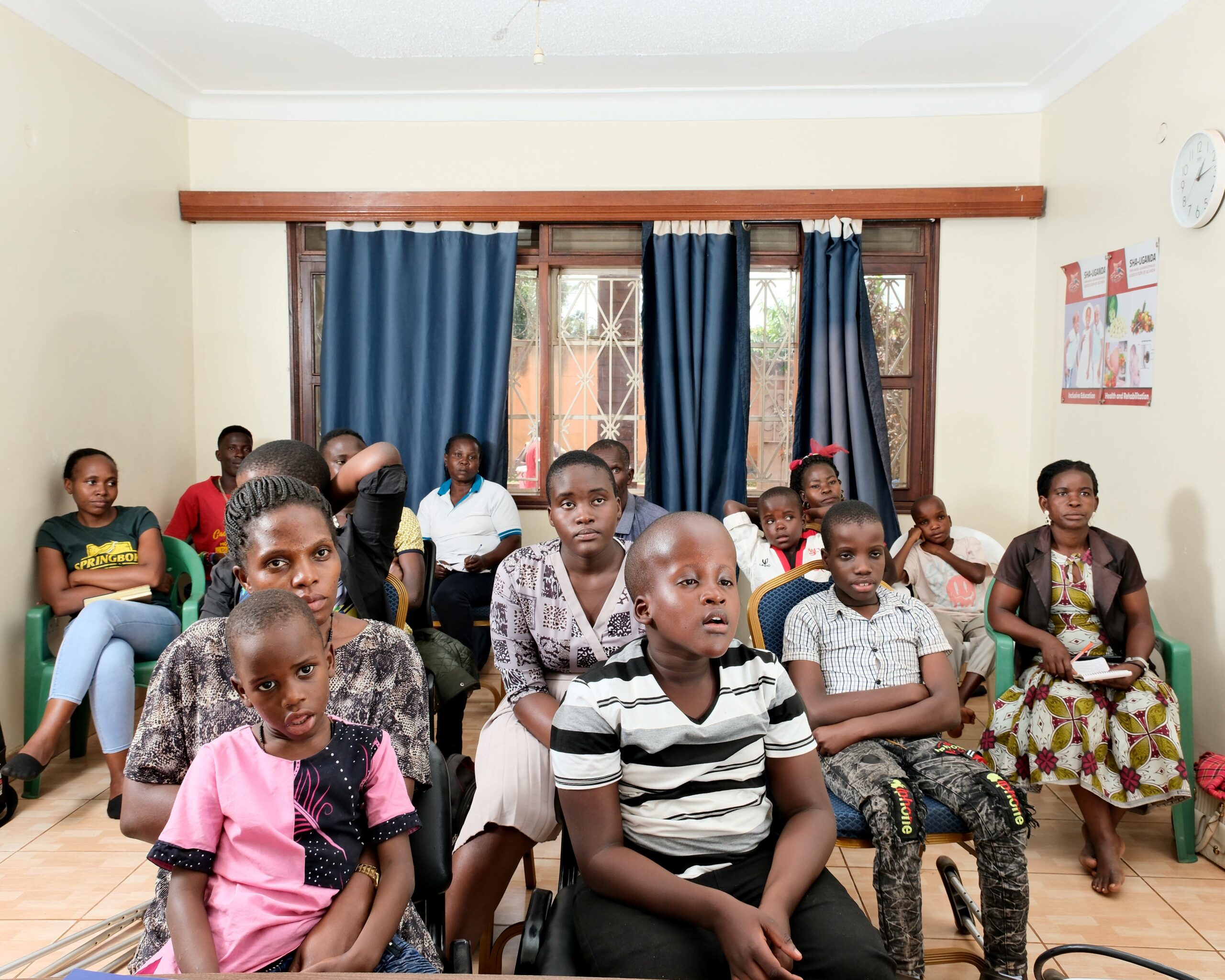
Exactly 61 years ago, Uganda gained its independence. This new week in Uganda begins with a bank holiday.
On the programme is a visit to the famous Lake Victoria. Before we set off, Ruth tells me that she wants us to visit two young people living in Entebbe, both of whom want to share unique stories with me. So we set off to the home of a young man, James.
The drive takes about 40 minutes. James lives with his family in a house his father built in the early 1990s, on a dusty path where many boda-bodas (local mopeds) and trucks come. Together with Benjamin and Dora, I take the time to get to know this 19-year-old young man with big dreams.
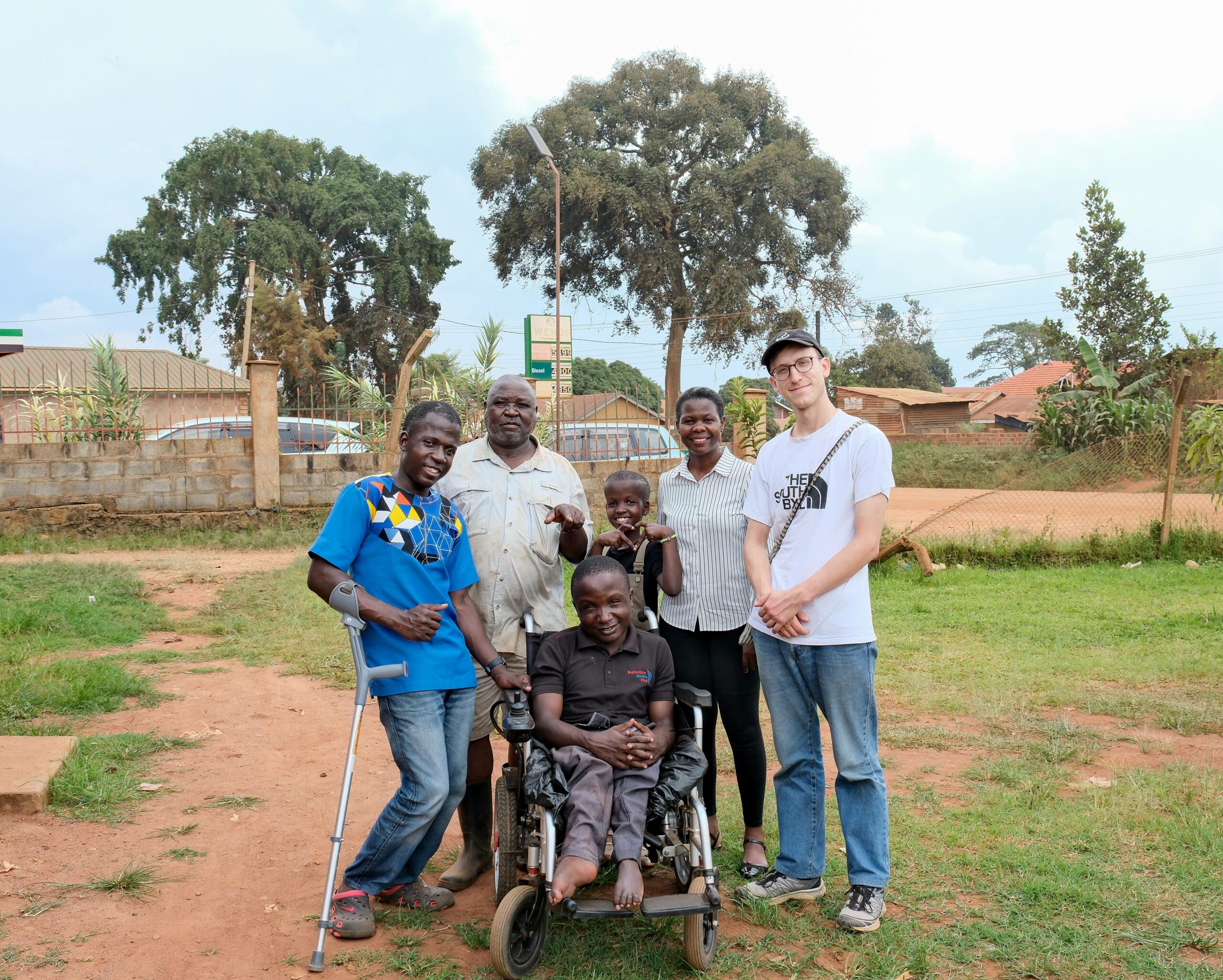
It has now been a week since I arrived in Kampala. Every day is a new adventure and so far I haven’t had time to really explore the “House of Hope”. I take time to talk to the young people currently staying at the house.
I meet Achraf and Bryan, aged 19 and 22. Their situation is unique because unlike all the children I have met so far who were between 4 and 15 years old, these two youngsters are quite mature and able to start looking after themselves and become more independent. I talk to them in their room, a space of about 40 square metres where they live with one more person. They each have their own bed and they have arranged their personal space in a specific way to make it as comfortable as possible. Ruth, SHAU’s national coordinator, is here to visit one of the young people and have a conversation with him. Her aim is to help him regain his motivation. It is not uncommon for young people to lose heart from time to time, so psychological support is very important.
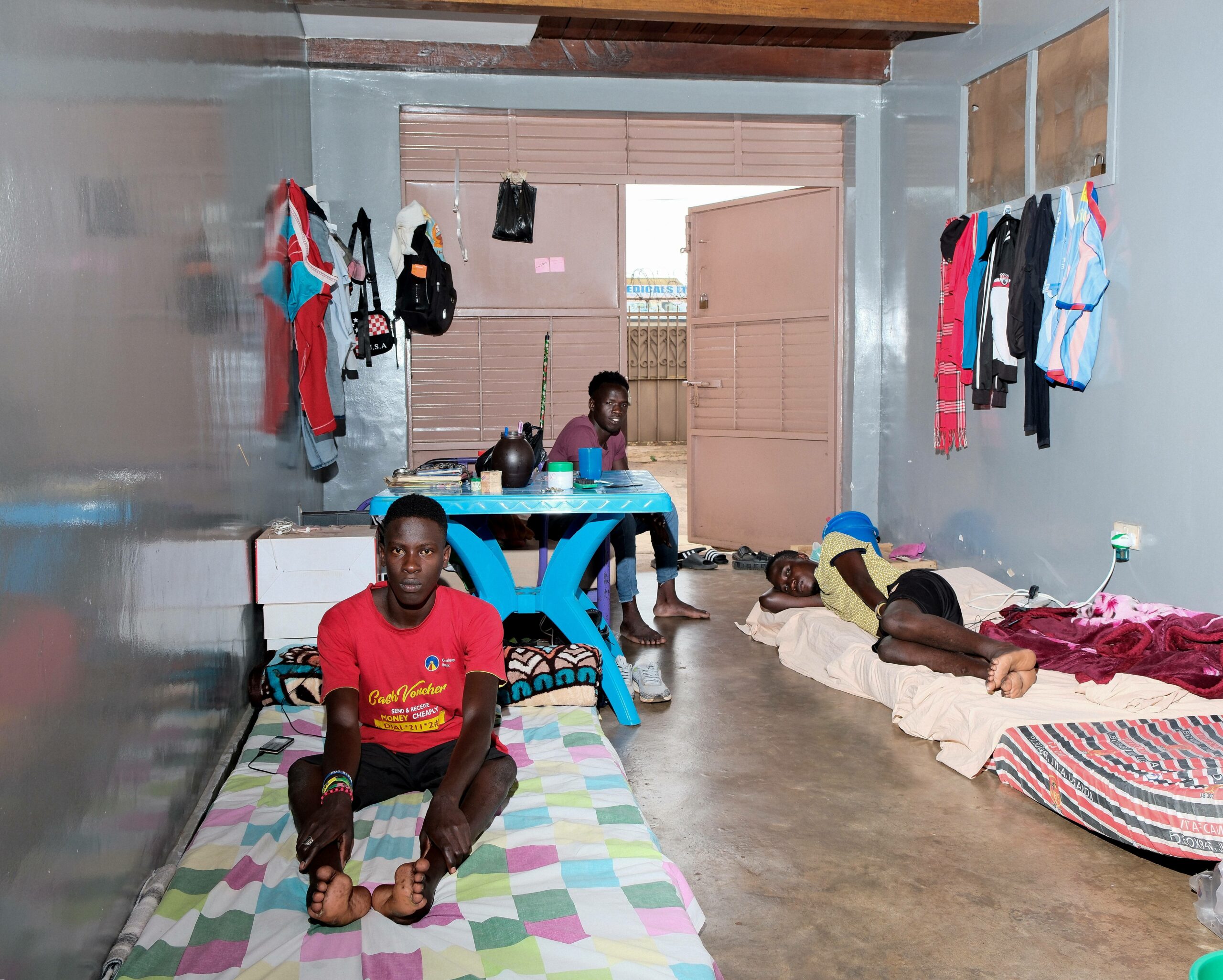
Let us not forget that these two conditions do not only involve physical difficulties that have to be overcome from birth. It is also a psychological struggle. Many of them have many questions and the distrust they face from most people at work and in daily life in general is a huge challenge.
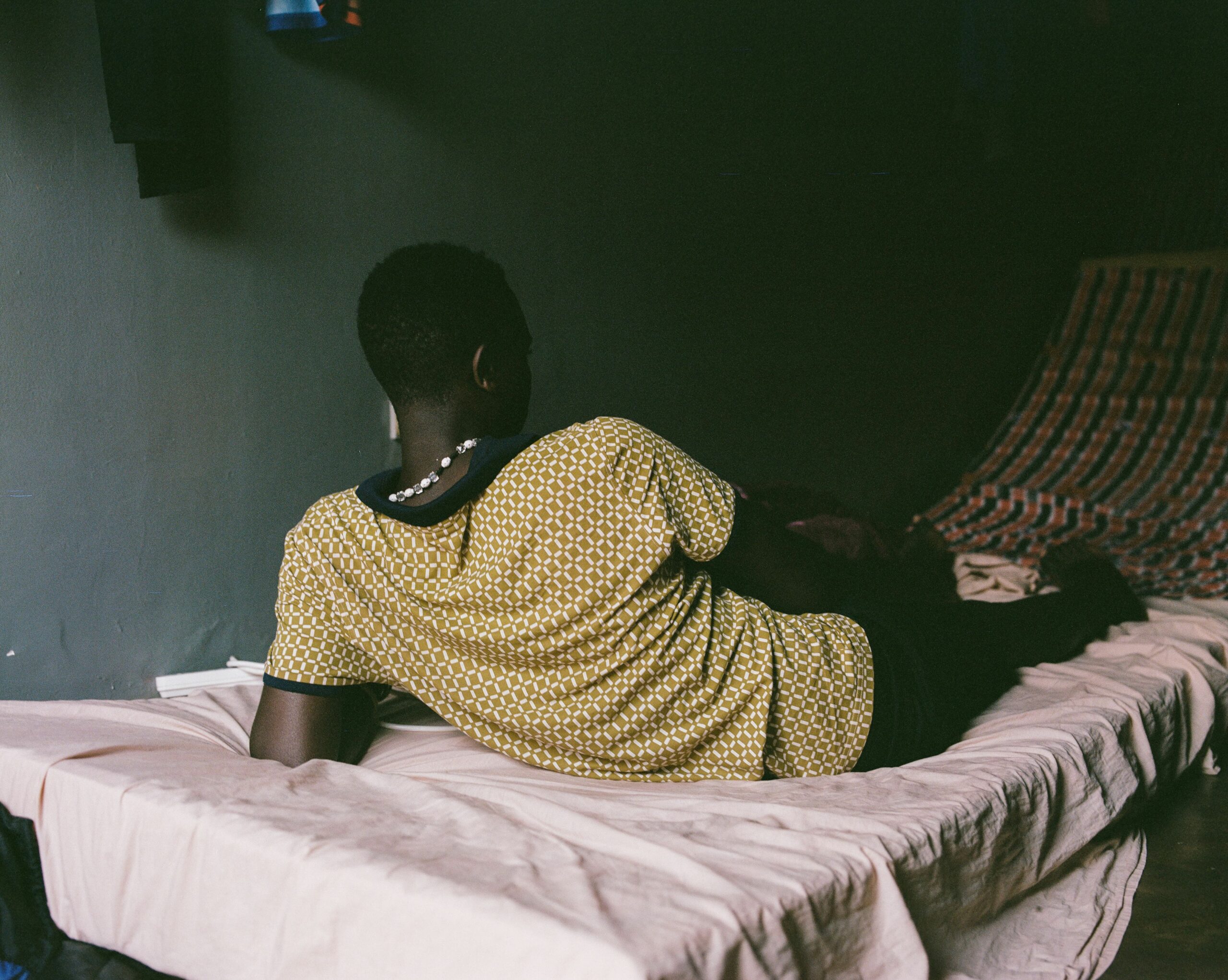
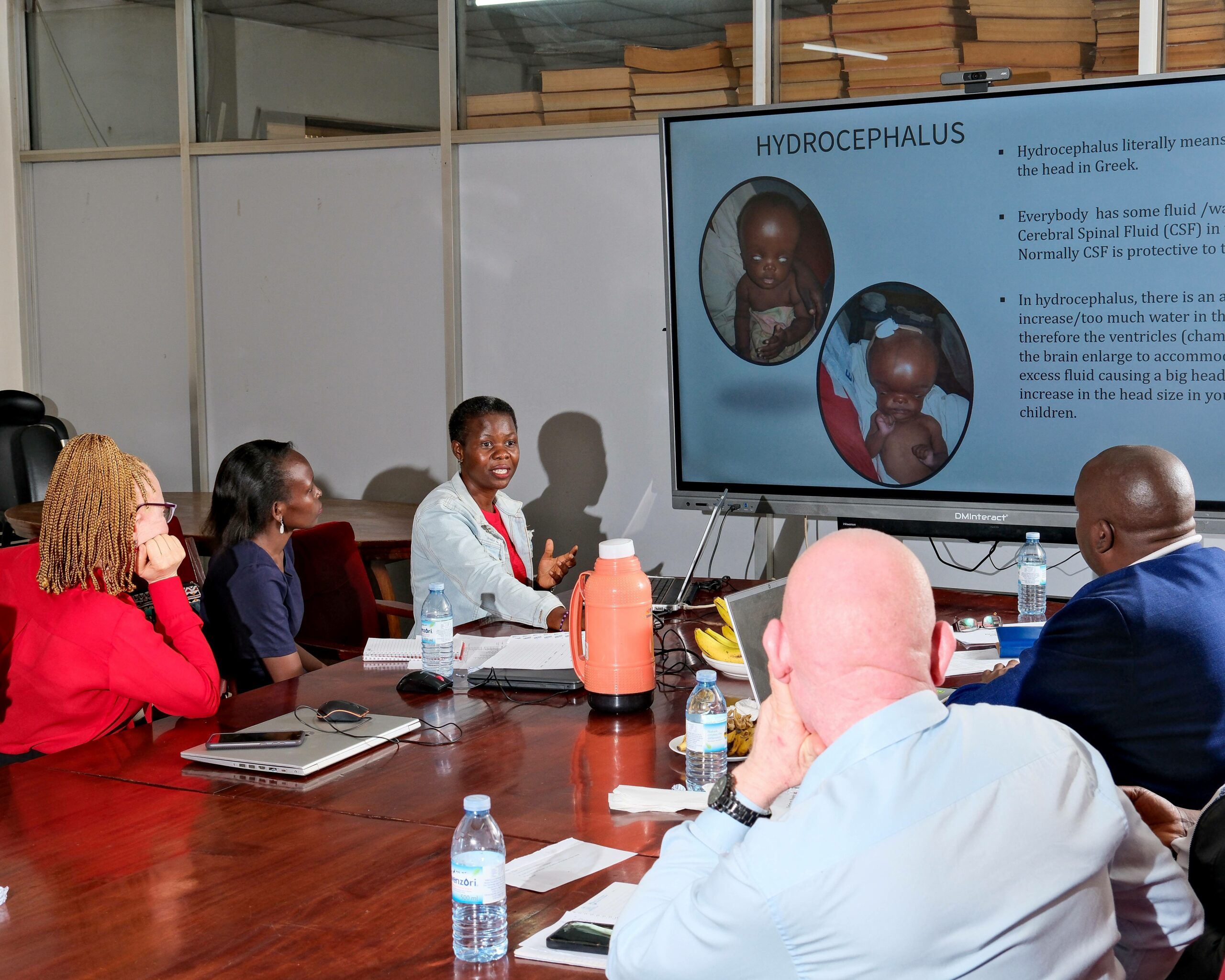
This morning, I accompany Ruth to a meeting she has at the ministry. I am introduced to a part of her work that often goes unseen. We drive straight to the centre of Kampala. I can see that Ruth is quite excited about this meeting, and to be honest, she has every reason to be. After about 30 minutes of driving through the city’s chaotic traffic, we arrive at the entrance to an imposing building. Everything looks very official and solemn. We go to the eighth floor and introduce ourselves to the other participants. Everyone present today is engaged in an admirable daily struggle. Among us are coordinators of an association fighting discrimination against people with autism in Uganda. Another organisation focuses on the prevention and care of the hearing impaired. Representatives of people with albinism are also here to talk about this condition in Uganda, where it is still a big taboo. All these coordinators have come to talk about their associations and related issues. It is necessary to discuss these issues with the political leaders, as it indirectly contributes to raising awareness among the general public about these still less known issues. The aim is to inform each other by sharing experiences and knowledge.
This morning, when I arrive at the House of Hope, Winfred and Dora tell me that mothers will arrive during the day to enrol in SHAU’s programme. I meet Florence and her son Derick. This 4-year-old boy has hydrocephalus and spina bifida and needs help. SHAU’s top priority is to teach the mother how to properly catheterise her child. Basic care is crucial. First and foremost, all procedures must be shown. Derick will get used to it this way and it will be a great help, especially to prepare him to perform these operations himself in the future.
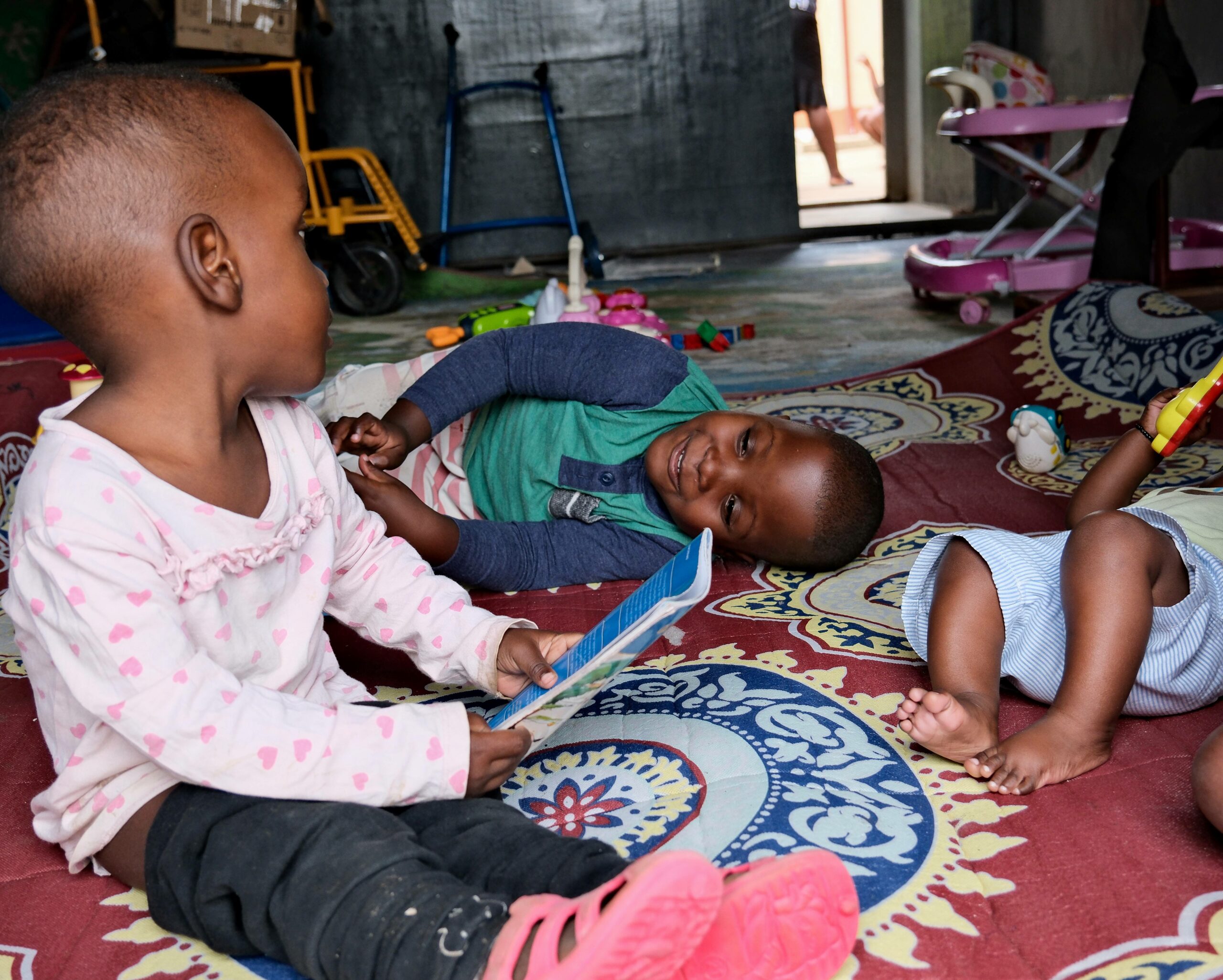
The other mother I had the pleasure of meeting during her enrolment came with her 6-year-old daughter, Teddy. Three days after her birth, Teddy had surgery on her back because of a deformity caused by spina bifida. She also has hydrocephalus and seven months after her birth, she underwent another surgery to drain excess fluid from her skull.
After the surgery, she became ill and doctors prescribed a powerful syrup that severely damaged her teeth. She also has severe deformities on her hands and feet, which prevent her from moving and learning to write, among other difficulties. Teddy, however, is an amazing young girl. Despite her young age and the complexity of her journey, she seems to be fully aware of what is happening and remains fearless. She is full of energy on her arrival and even poses for me. Dora explains to the mother and me that the goal is to get Teddy a wheelchair so she can go to school.
In the week since my arrival, I have had many experiences and encounters that have touched me deeply. What has struck me most is the remarkable positivity and resilience of people with disabilities here in Kampala. Their determination, courage and joy in the face of immense challenges are truly inspiring.
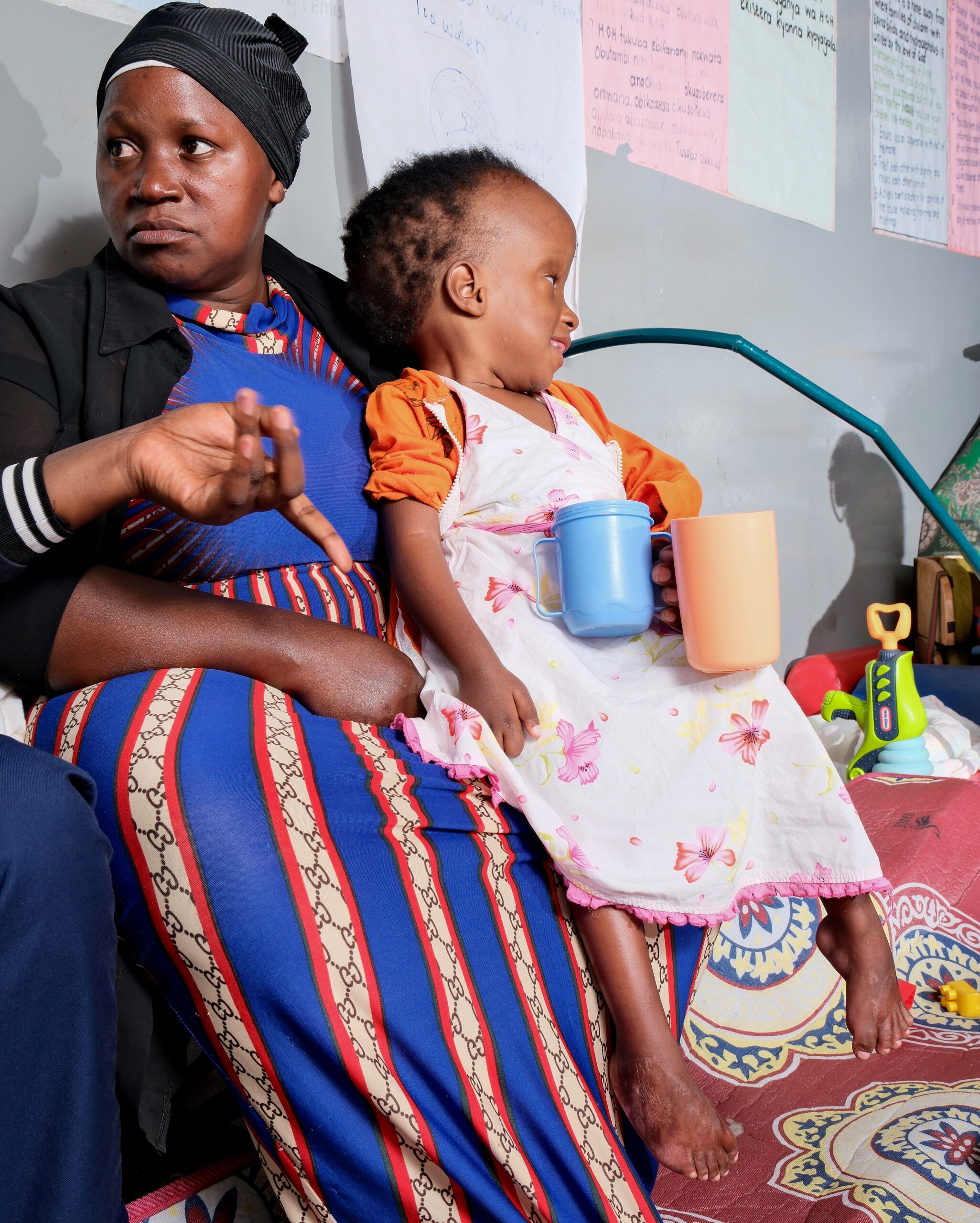
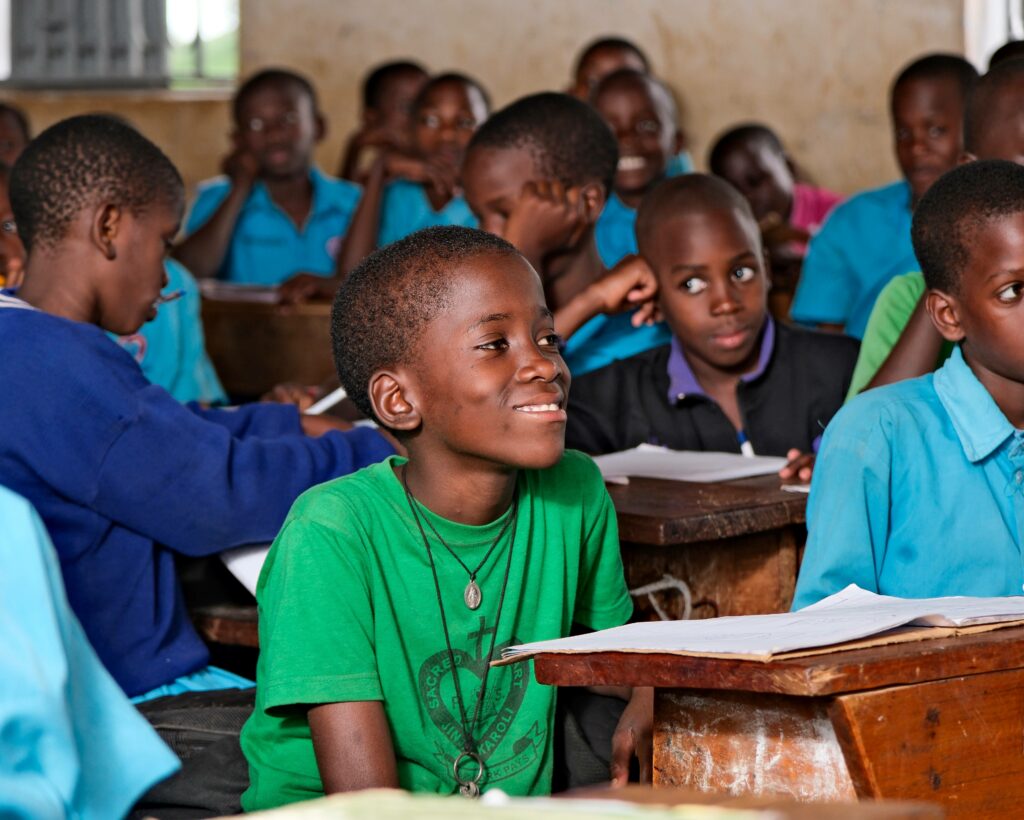
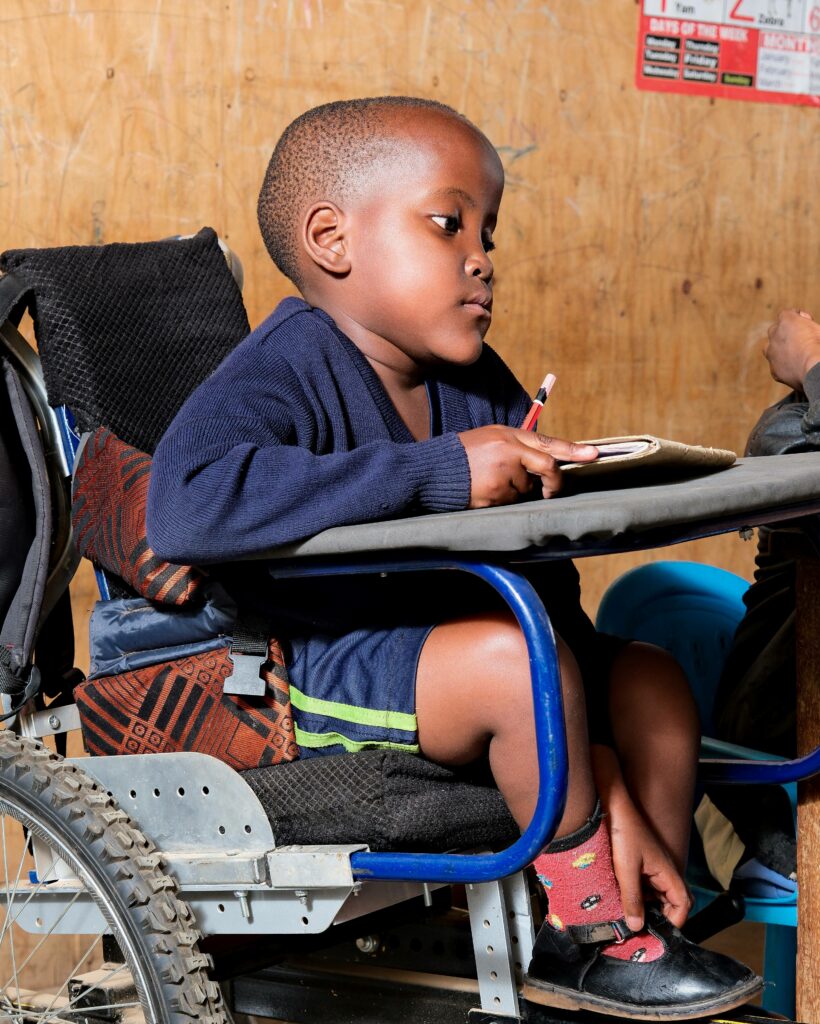
On Tuesday morning, I have the opportunity to visit a school located in the northern part of the capital, on a hill overlooking the city. What makes this institution unique is its strong advocacy and commitment to inclusive education. I meet an educator from the school who gives me a tour of five classrooms. I see students with Spina Bifida and Hydrocephalus who are fully integrated into the classes and treated just like any other student.
The visit shows me that these children with Spina Bifida and Hydrocephalus can easily integrate and continue their education as long as they receive the right support and guidance.
This Friday, Winfred invites me to join her to pick up some things at a rehabilitation centre that is about half an hour from the House of Hope. After spending two days in the office, I love getting out and exploring a new part of the city. On arrival, I meet Emmanuel. Emmanuel has been working in education for 27 years. His mission is to closely monitor the development of children with disabilities during their educational journey. His work is aimed at ensuring that these children feel included as much as possible in school and in society in general. Katalemwa House has been in existence since 1970. We take time for a tour and I discovered that the children staying there participate in numerous workshops. They learn skills such as baking, making things and other activities. The facility also produces wheelchairs, crutches and other mobility aids on a small scale, all “made in Uganda”. We spend the afternoon with Emmanuel, Winfred and others who work in this small home. I am told that it takes about two days to make a wheelchair and everything is made on site.
I spend the afternoon with the children and realise that these are incredibly brave teenagers. I am touched by their calmness and resilience. They speak little but they radiate something powerful. It really moves me. When I get back in the car, I don’t feel like I did before. Maybe I have learnt a lesson today.
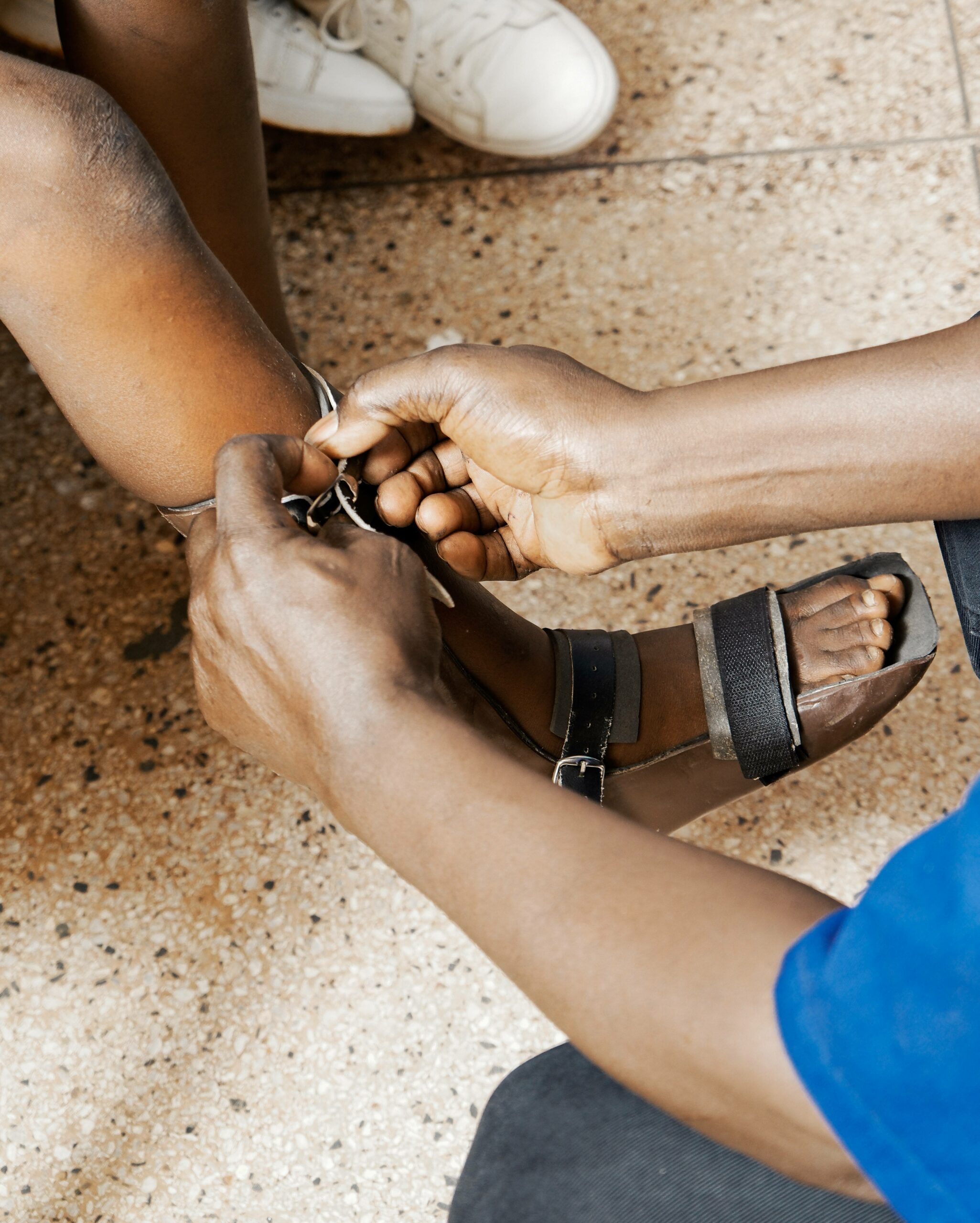
Steven and his father enter with smiles on their faces. I rush to greet them, filled with joy at the thought that young Steven is doing well after his amputation.
As a reminder, Steven was the first person I met on my arrival and his situation had become critical. He was in danger of having his feet amputated because of an increasingly serious infection.
I greet him warmly and strike up a conversation with him. I feel compelled to ask him how he feels and how he experienced the operation.
I hear him laugh and see him smiling constantly, which reassures me. His joy touches me deeply and the answers he gives me are even more amazing than I could have imagined. “It was good,” he tells me. “I watched cartoons in the hospital,” he adds. I see his father relieved and very happy with the result of the surgery. Life will be easier for him now. A lot of pride radiates from his eyes as he looks at his son with a shy smile.
This child is amazing. Through the power of his dreams, he shows (without realising it himself) a true proof of success for parents and children like him, that it is possible to overcome these difficult moments. Steven’s dream is to become a doctor and I am sure he will follow a path worthy of a leader.
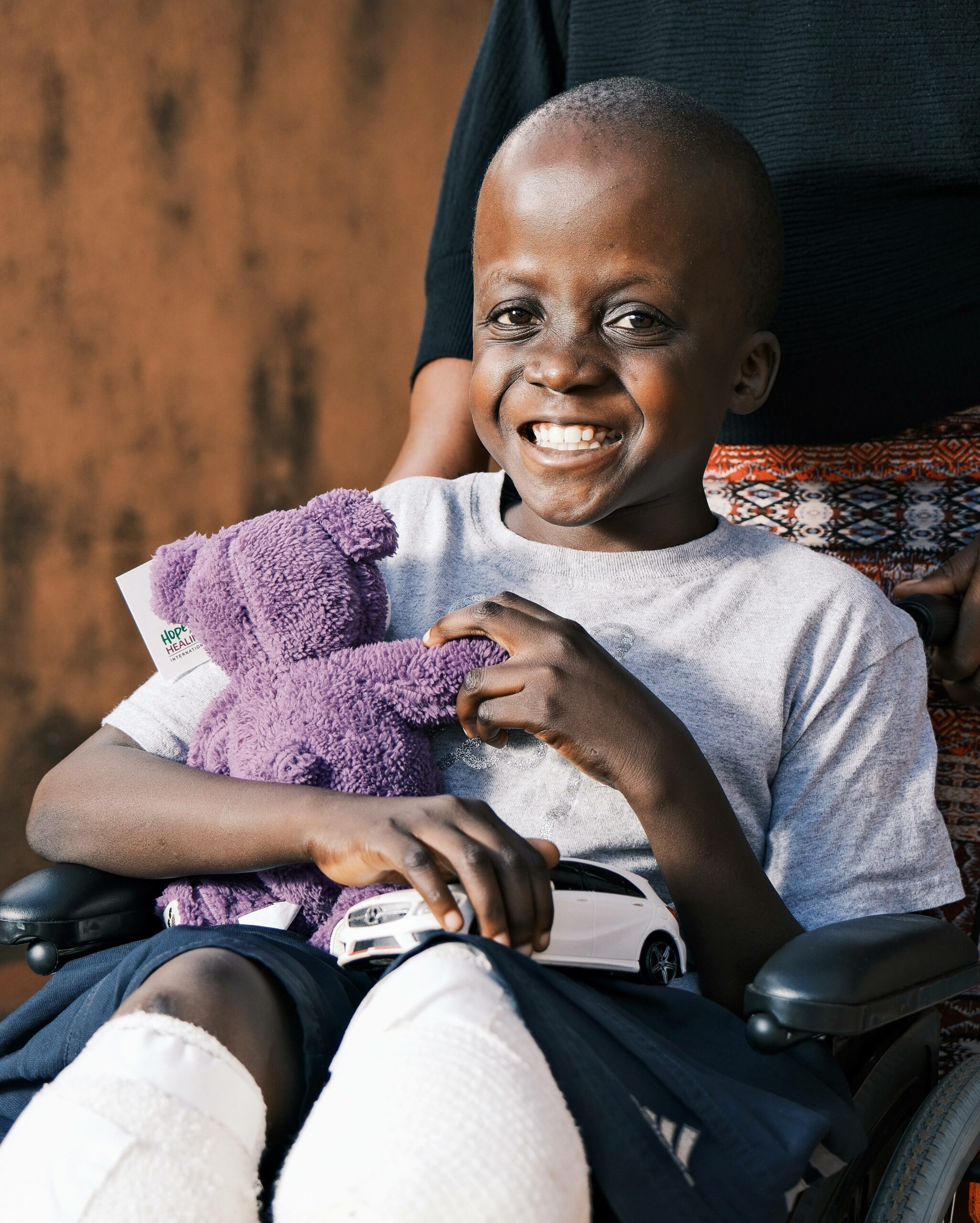
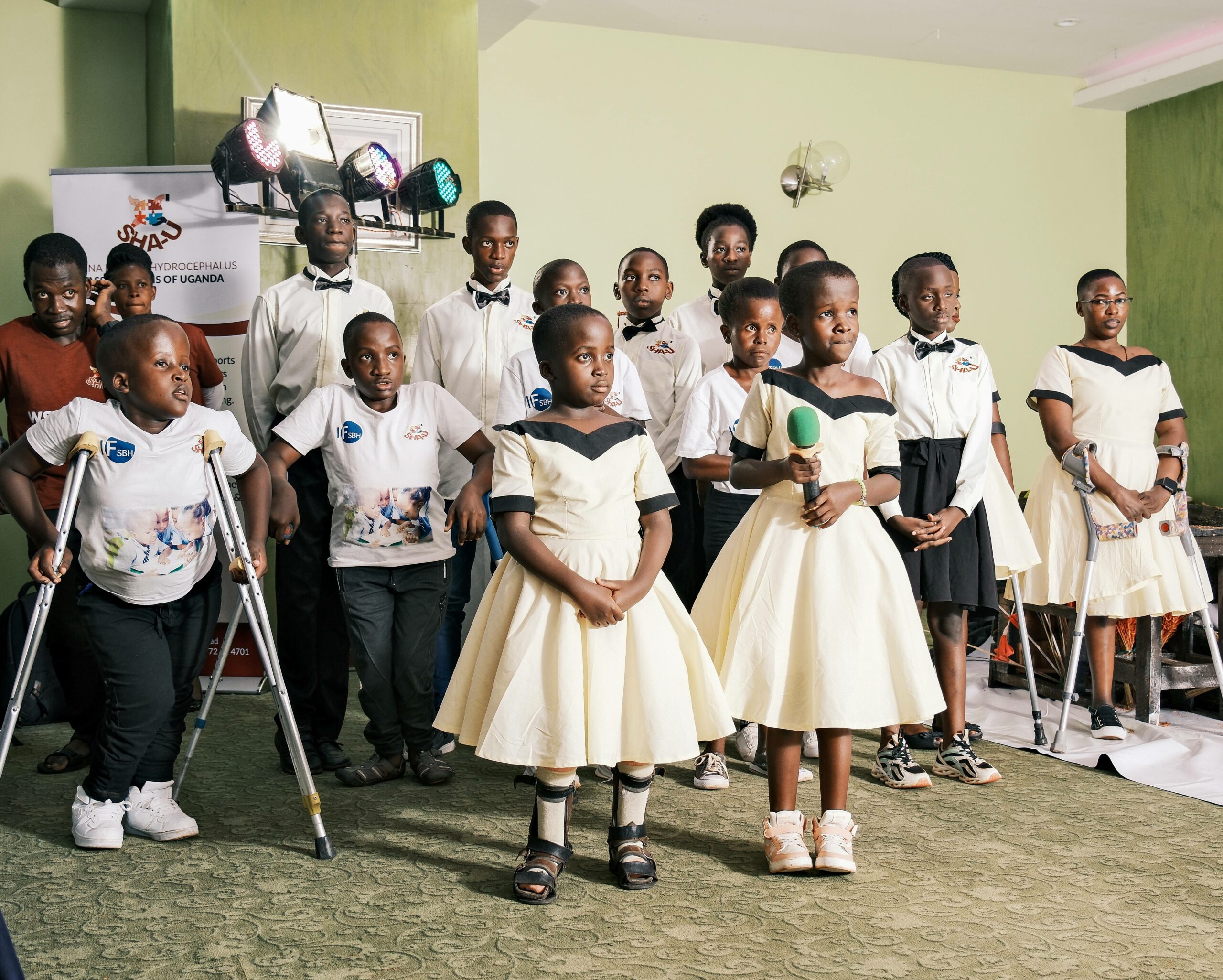
After finding a gap in Kampala’s chaotic traffic, we arrive at the ceremony site. Everyone is elegantly dressed and what stands out at first glance is the gratitude that emanates from those involved in this important day. I see pride in the eyes of the participants, fathers, mothers and organisers. Twenty, twenty-five years ago, these people hid who they were. They constantly feared judgements and reactions from others.
Today, these people are proud; these young people accept themselves as they are and claim their differences as strengths. Of course, there are still deep-seated stigmas in Uganda – fears, questions and contempt. However, parents and their children have more tools to counter these prejudices. In the 1990s, many young people felt alone, but now they know they are part of a community that is building strength day by day with one goal: inclusiveness.

The day after World Spina Bifida and Hydrocephalus Day, I take the initiative to go and visit a young man, Ruben.
Ruben lives with his parents on a national road near the entrance to Kampala’s Nateete district. It is a typical Kampala house. His mother welcomes us with a big smile, almost a sigh of relief. We have had a long taxi ride and are a bit tired, but that does not dampen our enthusiasm to share our experiences with Ruben. Just before my arrival, I heard from his mother that Ruben no longer wants to go to school. He often makes up excuses to avoid going. She whispers to me that she hopes I can find out the reason why he doesn’t want to go to school.
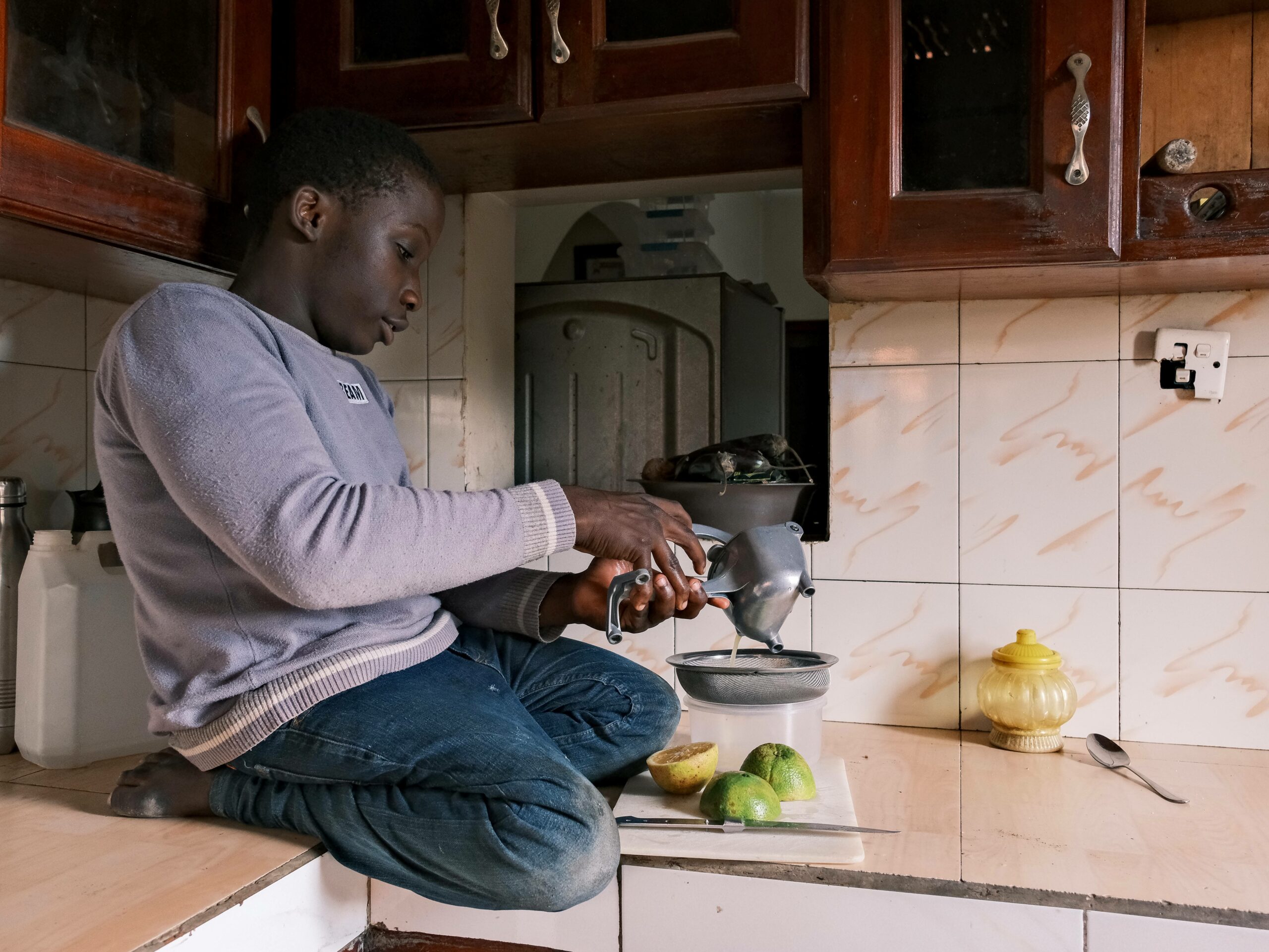
We have a conversation between the two of us about music, dreams and hobbies. He confides in me that his first dream was to become a pilot. Unfortunately, he no longer wants to pursue that dream after someone told him that he would not be able to fulfil it because of his Spina Bifida and Hydrocephalus-related disability. He now prefers to become an entrepreneur, although he does not yet know what he wants to undertake, but the idea will probably develop over time, I assume. At that point, I interrupt him and explain that he should not give up on his dreams. Of course, that is easier said than done, but it is possible. Ruben is lucky to have access to education. I tell him that if he wants to become an entrepreneur, he will have to start studying properly. He admits that he is gradually losing interest in school and sometimes wonders, “What am I doing here?” I understand him and reassure him. Like him, I was also 17 and understand when he asks himself that question. The problem is not related to his disability, but rather a teenage crisis he is struggling with. For two hours, I tried to explain to him that what he is feeling is normal and that he should not be ashamed to discuss it with his mother (who, by the way, is very worried about him). I tell him to find a way to communicate with her in his own way. Communication is the key to success.
I try to motivate him in my own way, make it clear to him that at his age, his only concern should be his education. Without it, it will be very difficult for him to succeed in the future.
The heavy rain suddenly stops. It is getting late and we need to get back before it gets dark. I leave Ruben convinced that he will get better and find a way to go back to school.
On 28 October, we visit Lubaga hospital for a dressing change for Steven. Steven underwent an amputation ten days earlier. Since then, he has been feeling much better and his father is relieved that they were able to put an end to the infection that had affected his son’s lower body. However, daily post-operative follow-up is needed. This involves close monitoring of the amputation site to avoid the risk of a new infection.
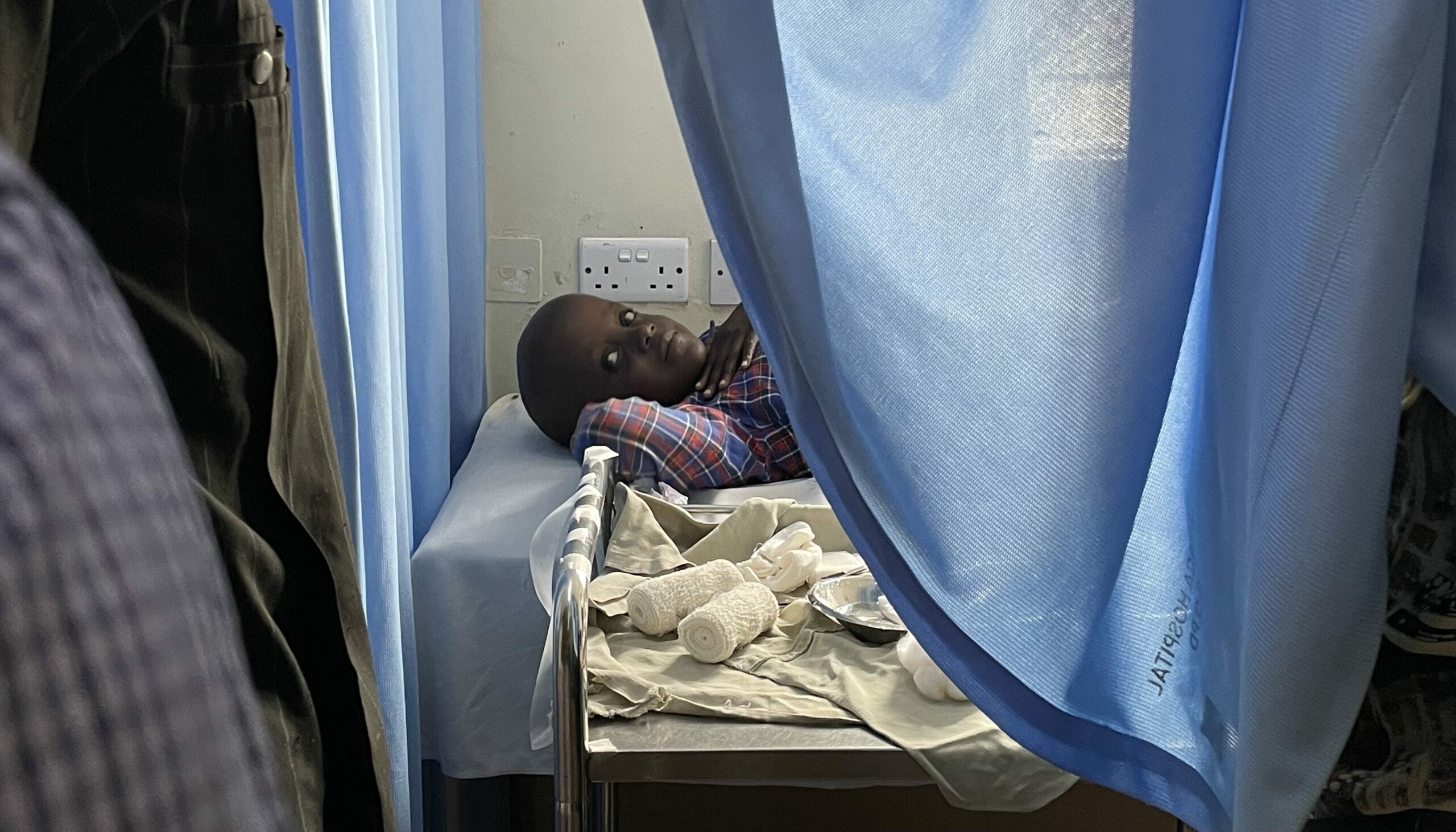
I accompanied Steven and his father to the Lubaga hospital, which is not far from the House of Hope. We chose to use a boda-boda, one of the most common means of transport in Kampala. Even though the distance is not very long, it is a first challenge for Steven and his father. The heavy traffic in the capital makes it dangerous and difficult to travel by boda-boda. Firstly, it lacks comfort and secondly, safety is almost non-existent.
Once we arrive at the hospital, we have to wait about two hours for a nurse for Steven. The nurse’s job is to disinfect Steven’s lower body and change his bandages. Photography is not allowed, but I managed to take a few pictures of Steven in the room with my smartphone
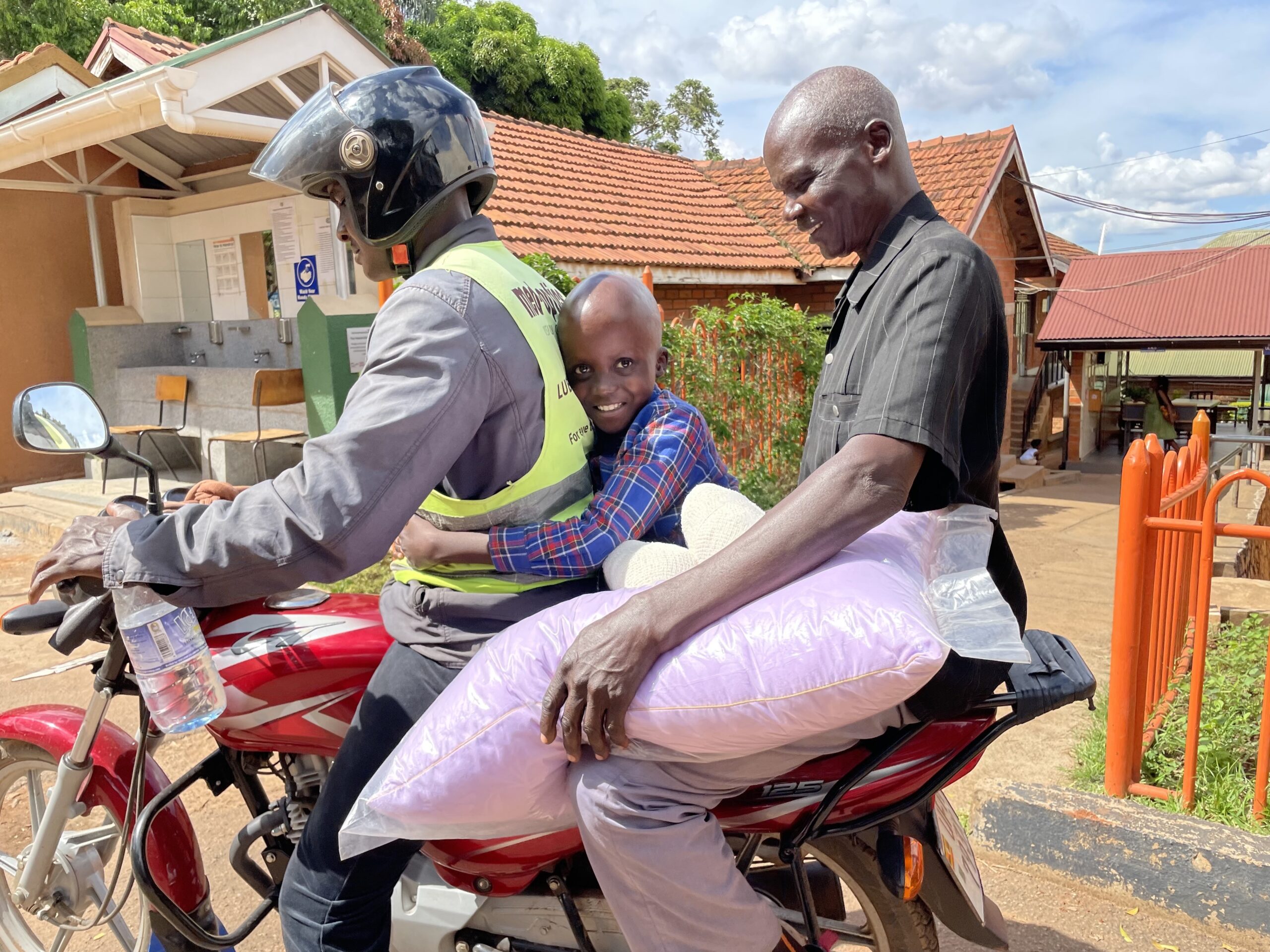
These meetings also made me realise how lucky we are in Belgium, and in Europe in general, when it comes to the healthcare resources available and the quality of services. The accessibility of healthcare, the medical equipment at our disposal and many other aspects are privileges we often take for granted, but which are not easily accessible everywhere else in the world.
This experience has opened my eyes to the need to advocate for equal opportunities and access to quality healthcare for all, regardless of where they live. It further strengthened my belief that through awareness and collective action, we can help improve the lives of people with major health problems. My trip to Kampala was an enlightening experience that encouraged me to think and take action to make the world a more inclusive and equitable place for all.
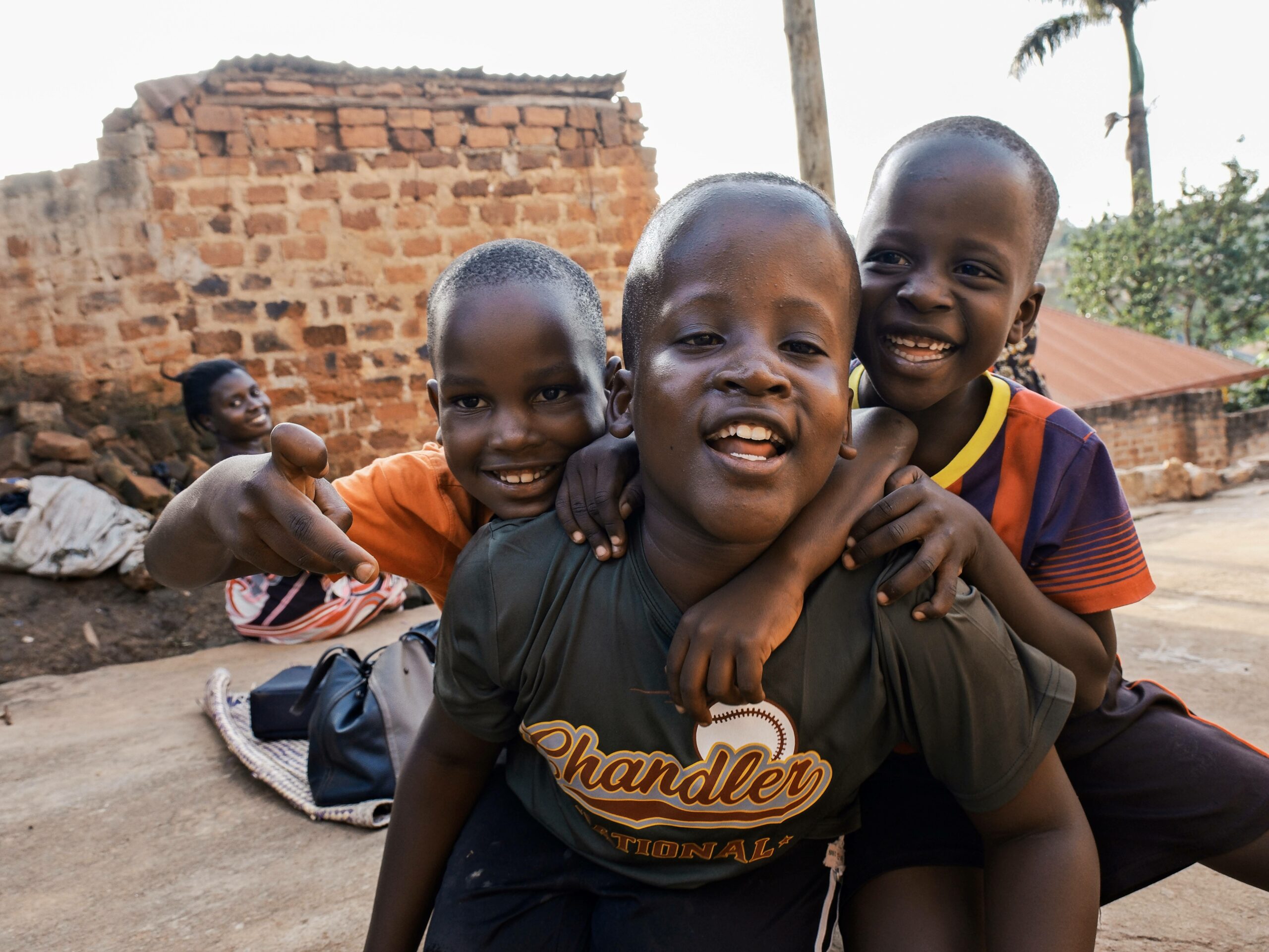
Daniil Zozulya